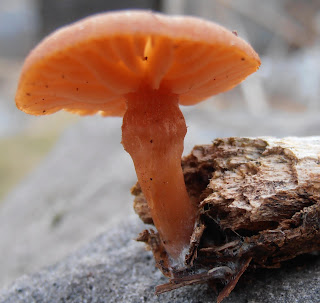It was during one of these walks that I had the pleasure of finding these Tubaria. It is difficult to identify the species without a microscopic study, probably Tubaria hiemalis or romagnesiana.
This small fungus can occur in the fall, grows in winter at least thaws and still growing in early spring. It typically grows on woody debris. In addition to its aesthetic appearence, it is interesting for the morels collector that I am.
This is a fungus that is often found just days before the arrival of the first morels, and requires, such as morels, good moisture conditions. It may therefore be a good indicator of the imminent arrival of morels.
Moreover, it is a hygrophanous fungus : the color of his hat cleared in case of low humidity due to excessive exposure to wind or sun and lack of rain. The presence of young mushrooms in a clear place sheltered from wind and sun is a bad omen for the growth of our coveted morels.
This small fungus can occur in the fall, grows in winter at least thaws and still growing in early spring. It typically grows on woody debris. In addition to its aesthetic appearence, it is interesting for the morels collector that I am.
This is a fungus that is often found just days before the arrival of the first morels, and requires, such as morels, good moisture conditions. It may therefore be a good indicator of the imminent arrival of morels.
Moreover, it is a hygrophanous fungus : the color of his hat cleared in case of low humidity due to excessive exposure to wind or sun and lack of rain. The presence of young mushrooms in a clear place sheltered from wind and sun is a bad omen for the growth of our coveted morels.











No comments:
Post a Comment
Thank you for participating !